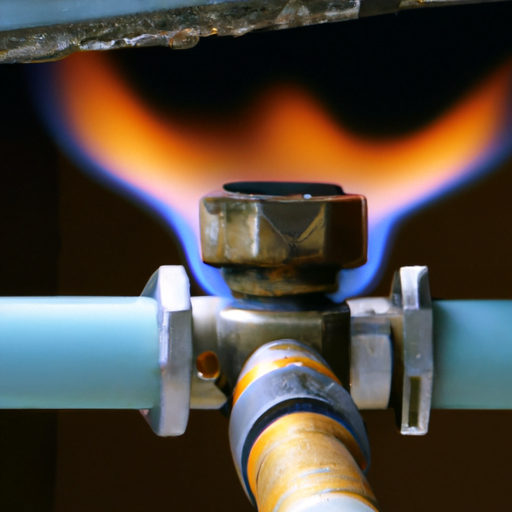Have you ever thought about living off the grid? You know, being completely self-sufficient and relying on your own resources for everything? It’s an appealing idea for many people, especially those who value sustainability and want to reduce their carbon footprint. But let me ask you this, have you ever wondered what the most efficient heating system would be in a scenario like that? Well, today we’re going to dive into that topic and explore the efficiency of off-grid heating systems.
When it comes to off-grid living, heating becomes a crucial aspect, especially in cold climates. You want a system that not only keeps you warm but also doesn’t drain your energy reserves. So, what is the most efficient heating system in the world? Well, there are several options to consider – from wood-burning stoves to solar thermal systems. Each comes with its own pros and cons, and in our upcoming article, we’ll discuss them in detail.
We’ll explore the science behind each system and how they work in off-grid settings. We’ll also delve into factors like energy efficiency, cost-effectiveness, and environmental impact. By the end of the article, you’ll have a better understanding of which heating system might be the best fit for your off-grid lifestyle. So, stay tuned and get ready to discover the efficiency of off-grid heating systems.

The Efficiency of Off-Grid Heating Systems
Are you tired of rising energy costs and want to reduce your carbon footprint? Off-grid heating systems may be the solution for you. These systems not only lower energy costs but also offer increased energy independence. In this article, we will explore the different types of off-grid heating systems available, their advantages, and factors to consider when choosing the right system for your needs.
Lower Energy Costs
One of the biggest benefits of off-grid heating systems is the lower energy costs they offer. When you generate your own heat, you eliminate the need to pay for utility bills, which can be a significant expense for many households. By opting for off-grid heating, you can save money in the long run, especially if you live in an area where heating costs are high.
Reduced Carbon Footprint
Another advantage of off-grid heating systems is the reduced carbon footprint they leave behind. Traditional heating systems often rely on fossil fuels, which contribute to greenhouse gas emissions and climate change. Off-grid heating systems, on the other hand, use renewable energy sources or clean-burning fuels, resulting in a smaller carbon footprint. By choosing off-grid heating, you are contributing to a more sustainable and greener future.
Increased Energy Independence
Off-grid heating systems provide you with increased energy independence. By generating your own heat, you are not reliant on utility companies or the grid. This can be especially beneficial in remote areas where access to conventional heating systems may be limited. With an off-grid heating system, you have the control and freedom to heat your home without worrying about power outages or rising utility costs.
Different Types of Off-Grid Heating Systems
There are several types of off-grid heating systems available, each with its own benefits and considerations. Let’s explore some of the most popular options:
Solar Heating Systems
Solar heating systems harness the power of the sun to provide heat. They consist of solar panels that capture sunlight and convert it into usable energy. This energy can then be used to heat your home and provide hot water. Solar heating systems are a renewable and sustainable energy source, as they rely on the sun’s infinite supply of energy. They are also highly efficient and require minimal maintenance. Solar heating systems have a long lifespan, making them a cost-effective choice in the long run.
Wood-Burning Stoves
Wood-burning stoves have been used for centuries to provide heat. These stoves burn wood as fuel, which is a renewable resource if managed properly. Wood-burning stoves are reliable heat sources and can keep your home warm even during power outages. In addition to heating your home, they can also be used for cooking and creating a cozy atmosphere. Wood is generally accessible and economical, making wood-burning stoves a popular choice for off-grid heating systems.
Geothermal Heating Systems
Geothermal heating systems utilize the heat stored in the earth to provide warmth. These systems extract heat from the ground through pipes buried underground and distribute it throughout your home. Geothermal heating systems are highly efficient, as the earth’s temperature remains relatively constant year-round. They are also environmentally friendly, as they do not rely on fossil fuels. While geothermal heating systems may require a significant upfront investment, they offer long-term financial benefits with lower operating costs.
Factors to Consider in Choosing an Off-Grid Heating System
Choosing the right off-grid heating system for your home requires careful consideration of several factors. Here are some key factors to keep in mind:
Climate and Weather Conditions
The climate and weather conditions in your area play a crucial role in determining which off-grid heating system is most suitable for you. For example, if you live in a region with an abundant supply of sunlight, a solar heating system might be a viable option. On the other hand, if you live in an area with cold winters and limited sunlight, a wood-burning stove or geothermal heating system might be more appropriate.
Availability of Fuel Sources
Consider the availability of fuel sources in your area. If you choose a wood-burning stove, ensure that you have access to a sustainable wood supply. If you opt for a geothermal heating system, ensure that you have proper access to the ground for installation. Assessing the availability of fuel sources will help you determine which off-grid heating system is the most practical and cost-effective for your location.
Size and Layout of the Property
The size and layout of your property are important factors to consider when selecting an off-grid heating system. Some heating systems require more space for installation, such as geothermal systems that require drilling. Ensure that your property can accommodate the chosen system and that it meets your heating needs effectively.

Advantages of Solar Heating Systems
Solar heating systems offer numerous advantages. Let’s explore some of the key benefits:
Renewable and Sustainable Energy Source
Solar energy is a renewable and sustainable energy source. By harnessing the power of the sun, solar heating systems eliminate the need for fossil fuels. The sun’s energy is abundant and available for free. By installing solar panels, you can tap into this renewable energy source and reduce your reliance on non-renewable resources.
Efficient and Low Maintenance
Solar heating systems are highly efficient, with many panels boasting high conversion rates of sunlight into usable energy. They require minimal maintenance once installed, making them a hassle-free option. Unlike traditional heating systems that may require regular service and repairs, solar heating systems can generally operate smoothly for years with minimal maintenance.
Long Lifespan
Solar panels generally have a lifespan of 25 to 30 years or more. This means that once you install a solar heating system, you can enjoy its benefits for decades to come. Solar panels are designed to withstand various weather conditions, ensuring their longevity. Investing in a solar heating system provides you with a long-term heating solution and a significant return on investment.
Benefits of Wood-Burning Stoves
Wood-burning stoves have distinct advantages that make them a popular choice for off-grid heating. Let’s explore some of their benefits:
Reliable Heat Source
Wood-burning stoves provide reliable heat, even during power outages. By burning wood, these stoves generate a steady and consistent heat output. You can rely on a wood-burning stove to keep your home warm when conventional heating systems fail.
Ability to Heat Surrounding Areas
Wood-burning stoves are known for their ability to heat not just the room they are located in, but also the surrounding areas. The heat generated from a wood-burning stove can radiate throughout your home, keeping multiple rooms warm and cozy. This makes wood-burning stoves a practical choice for larger properties or open floor plans.
Economical and Accessible
Wood is generally considered an economical and accessible fuel source. With proper management and sourcing, you can ensure a sustainable supply of wood for your wood-burning stove. Wood is often readily available in many areas, making it a cost-effective option for off-grid heating. Additionally, using wood as a fuel source can also contribute to a lower carbon footprint compared to fossil fuel alternatives.
Advantages of Geothermal Heating Systems
Geothermal heating systems offer several advantages that make them an attractive option for off-grid living. Let’s explore some of their benefits:
Highly Efficient and Cost-Effective
Geothermal heating systems are highly efficient at converting heat from the ground into usable energy. They can provide both heating and cooling for your home, making them a versatile choice. Geothermal systems can operate at efficiencies of over 400%, meaning for every unit of energy used to power the system, you get four units of heat in return. This high efficiency translates to lower energy costs and savings in the long run.
Environmentally Friendly
Geothermal heating systems are environmentally friendly, as they rely on the natural heat stored in the earth. They do not emit greenhouse gases during operation and are a clean alternative to traditional heating systems. By choosing a geothermal heating system, you are contributing to a healthier and more sustainable planet.
Long-Term Financial Benefits
While geothermal heating systems may require a significant upfront investment, they offer long-term financial benefits. Once installed, these systems have low operating costs compared to traditional heating systems. They require little to no maintenance and have long lifespans, ensuring you get a return on your investment over time.
Comparing Efficiency of Off-Grid Heating Systems
When choosing an off-grid heating system, it’s essential to consider the efficiency of each system. Here are some key factors to compare:
Energy Output
Compare the energy output of different heating systems. How much heat can each system generate? Consider your heating needs and ensure that the chosen system can meet those requirements effectively.
Fuel Consumption
Evaluate the fuel consumption of each system. How much fuel do they require to produce heat? Consider the availability and sustainability of the fuel source when making your decision.
Heat Distribution
Consider how effectively each system distributes heat throughout your home. Does the system have the capability to heat multiple rooms or the entire property? Ensure that the chosen system can meet your specific heating needs.
Considerations for Off-Grid Living
When living off-grid and relying on an off-grid heating system, there are additional considerations to keep in mind. Here are some key factors to consider:
Energy Needs and Lifestyle
Assess your energy needs and lifestyle. Off-grid living requires a conscious approach to energy consumption. Determine how much heat you need, as well as other energy requirements such as hot water and electricity. This will help you choose a heating system that meets your needs efficiently.
System Installation and Maintenance
Consider the installation and maintenance requirements of the chosen system. Some systems may require professional installation, while others can be installed by homeowners with the right knowledge and tools. Assess the maintenance needs of the system to ensure that you can keep it running smoothly.
Backup Heating Options
Having a backup heating option is essential when living off-grid. Consider alternative heating options in case your primary system fails or requires maintenance. This will help you stay comfortable and warm even during unforeseen circumstances.
Conclusion
Off-grid heating systems offer numerous benefits, from lower energy costs and reduced carbon footprints to increased energy independence. When choosing an off-grid heating system, consider factors such as climate, fuel availability, and property size. Solar heating systems, wood-burning stoves, and geothermal heating systems are among the most popular options, each offering unique advantages. By comparing the efficiency of different off-grid heating systems, you can make an informed decision that best meets your needs. Off-grid living requires careful consideration of energy needs, system installation, and maintenance, as well as having backup heating options. Embrace the efficiency of off-grid heating systems and enjoy the benefits of lower energy costs and a more sustainable lifestyle.




